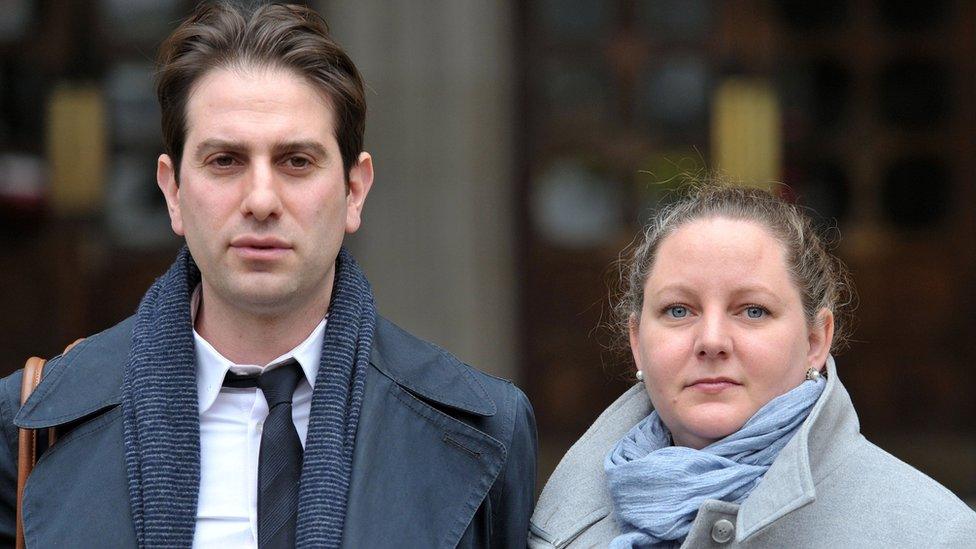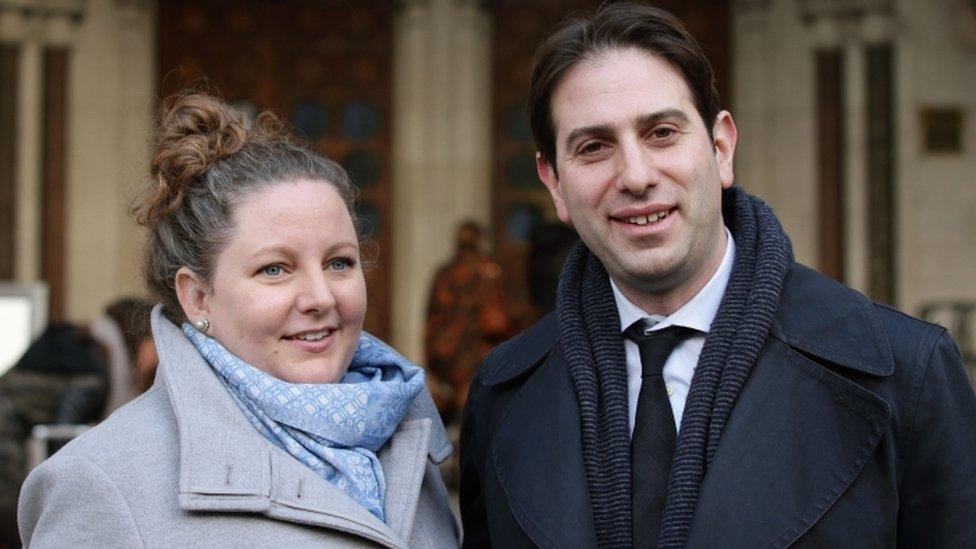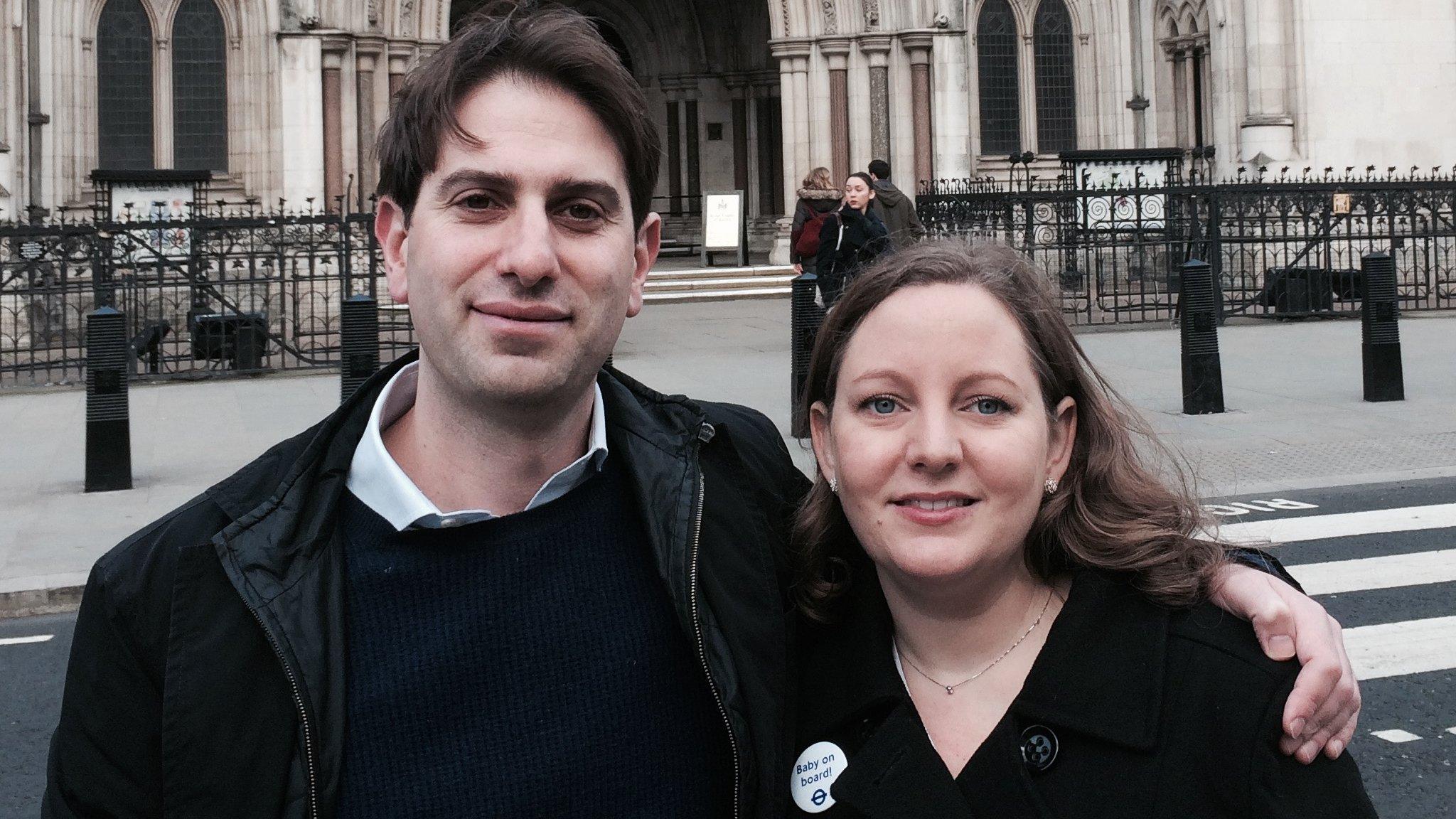Heterosexual couple lose civil partnership court challenge
- Published

Charles Keidan and Rebecca Steinfeld want their relationship recognised in law, but they do not want to get married
A heterosexual couple who want to have a civil partnership rather than get married have lost a legal challenge.
Rebecca Steinfeld and Charles Keidan, from London, were told in 2014 that they could not have a civil partnership because they did not meet the legal requirement of being of the same sex.
They took their case to the High Court, saying they faced discrimination.
But Mrs Justice Andrews dismissed their claim, external for judicial review. The couple have said they intend to appeal.
One of the government's arguments was that now gay couples are able to marry, civil partnerships might be abolished or phased out in the future, and changing legislation before then would be "costly and complex".
A government spokesperson welcomed the ruling, saying the "current regime of marriage and civil partnership does not disadvantage opposite sex couples".
Family values
Ms Steinfeld, 34, and Mr Keidan, 39, said they wanted to commit to each other in a civil partnership as it "focuses on equality" and did not carry the patriarchal history and associations of marriage.
However, the Civil Partnership Act 2004 - which applies throughout the UK - requires that partners be "two people of the same sex". It grants gay couples legal rights similar to those given to married couples.
The introduction of same-sex marriage - which became legal in England, Wales and Scotland in 2014 - has since given gay couples a choice between that and civil partnership.
Ms Steinfeld and Mr Keidan argued that, as a heterosexual couple, they did not have the same choice as gay couples and were therefore discriminated against.
Current legislation was "incompatible" with their right to a private and family life, they said.
The government argued that civil marriage was an institution that protected the core values of family life and was entirely egalitarian, and that where the objection was ideological there was no infringement of rights.

Analysis

By Clive Coleman, BBC legal affairs correspondent
Some observers will be surprised by today's ruling. An important part of the foundation of modern human rights and equality law is the protection against discrimination on grounds including sexual orientation.
The Civil Partnership Act 2004 appears to fly directly in the face of that.
It requires civil partners to be "two people of the same sex", meaning gay couples can now choose marriage or a civil partnership, whilst heterosexual couples can only marry.
However, Mrs Justice Andrews ruled that the different treatment of gay and opposite-sex couples didn't infringe the right to a private and family life enshrined in Article 8 of the European Convention of Human Rights.
And even if it did, maintaining the different treatment is justified, essentially because opposite-sex couples can enter civil marriages, which are egalitarian and encompass the core principles of family life.

After the ruling, Ms Steinfeld said the government was "barring us, and many thousands of opposite-sex couples like us, from the choice of forming a civil partnership".
She told the BBC: "We are very disappointed in the judge's ruling today, which we think undermines equality in the United Kingdom.
"And we know that that disappointment will be shared in the court of public opinion because we have 36,000 people who've signed our change to all petition supporting opening up civil partnerships to all."
Mr Keidan said "the fight goes on" and there was still a chance "for this wrong to be righted in time".
Human rights campaigner Peter Tatchell, who has championed the case for equal civil partnerships for more than a decade, said the ruling was "a sad defeat for love and equality".
Meanwhile, Ava Lee, campaign manager of the Equal Civil Partnership campaign, said it was time the government reconsidered its position on civil partnerships
'Not disadvantaged'
At a hearing earlier this month, the government said the future of civil partnerships had not been decided.
It said it would wait "to see how extending marriage to same-sex couples impacts upon civil partnerships before reaching a final decision on the future of civil partnerships".
Dan Squires, counsel for the government, said ministers had decided it was "not necessary to undertake the costly and complex exercise of extending civil partnerships in the interim where they may be abolished or phased out in a few years".
Mrs Justice Andrews said the government was "acting well within the ambit of discretion afforded to it with regard to the regulation of social matters".
"Opposite-sex couples are not disadvantaged by the hiatus, because they can achieve exactly the same recognition of their relationship and the same rights, benefits and protections by getting married, as they always could," she said in her ruling.
She concluded: "The government's decision to wait and see serves the legitimate aim of avoiding the unnecessary disruption and the waste of time and money that plunging into a programme of legislative reform without waiting is likely to produce."
- Published19 January 2016

- Published23 December 2014
